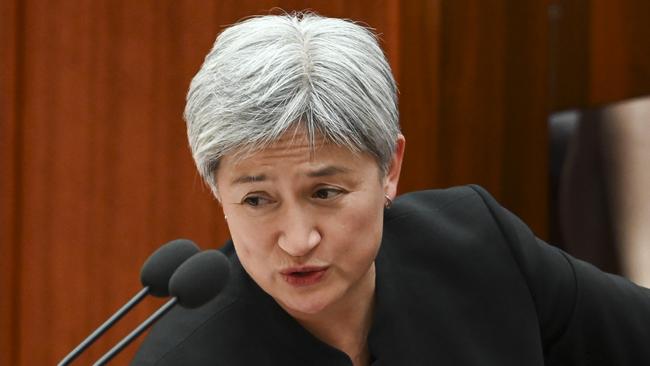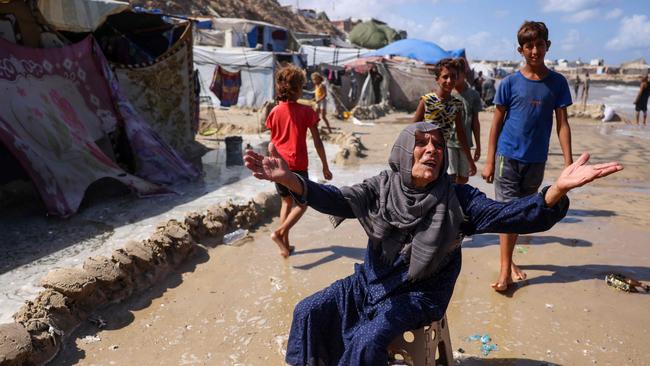US urges Australia over UN’s Israel vote
The Albanese government is facing US pressure to reject a draft UN resolution by the Palestinian Authority demanding an immediate Israeli withdrawal from Gaza and the West Bank and sanctions against the Jewish state.

The Albanese government is facing US pressure to reject a draft UN resolution by the Palestinian Authority demanding an immediate Israeli withdrawal from Gaza and the West Bank and sanctions against the Jewish state.
The proposed resolution, which makes no mention of Hamas or its October 7 terrorist attack on Israel, is the first by Palestine since it became a de facto UN member four months ago with the support of Australia and 142 other nations.
The eight-page motion demands Israel comply with a non-binding International Court of Justice opinion in July urging an end to its “unlawful presence” in the Occupied Palestinian Territories, with a complete and unconditional withdrawal from Gaza and the evacuation of Israeli settlers from the West Bank. It calls for reparations for Palestinians, sanctions and travel bans on Israelis linked to the occupation of the territories, and a ban on arms sales to the Jewish state.
The US is urging its allies and partners to reject the draft resolution or at least abstain from voting on it when it comes before the UN General Assembly on Thursday (AEST).
The Albanese government is weighing its position after breaking with the US in May to grant UN rights and privileges to “the State of Palestine”.
Foreign Minister Penny Wong’s office declined to comment on Australia’s voting intentions, but a senior government source said the draft resolution raised a number of issues and talks were underway with like-minded countries. Opposition foreign affairs spokesman Simon Birmingham called on the government to declare its opposition to the draft resolution “without hesitation or ambiguity”.
“This is an extreme and one-sided resolution that is shamefully silent about Hamas, the atrocities of 7 October 2023 or the hostages still being held nearly a year later. It provides no recognition of Israel’s right to exist,” Senator Birmingham said.
“The provocative actions it demands other nations take against Israel are clearly contrary to Australia’s longstanding positions, would undermine Israel’s right to self-defence and would be counter-productive to peace efforts. Unlike far too many occasions when the Albanese government has weakened Australia’s position, on this occasion Labor should show resolve and stand with our closest allies by opposing it.”

ANU professor of international law Don Rothwell said UN General Assembly resolutions were non-binding but there was “every prospect that this would create certain political consequences and flow on impacts”.
The motion will go to a vote days before world leaders arrive in New York for their annual gathering at the UN. Senator Wong, who announced new financial sanctions on five Iranian security officials on Monday, will attend next week’s sitting in Anthony Albanese’s place.
The Foreign Minister will use the session to call for improvements in co-ordination between Israel’s forces and international aid agencies as recommended by the Binskin report on the deaths of Australian woman Zomi Frankcom and her six World Central Kitchen colleagues.
Israel is lobbying diplomatic partners to vote against the Palestinian Authority, which it says will further isolate it from the international community and strengthen the hand of Iran and its proxies. Israeli Foreign Minister Israel Katz has threatened to “break and dissolve” the Palestinian Authority if it moved forward with the draft resolution.
Australia/Israel and Jewish Affairs Council executive director Colin Rubenstein said the proposed resolution would be the “ultimate reward” for Hamas’ terrorism. “Surely Australia will vote against this ultra-extreme resolution, which amounts to a complete repudiation of the bipartisan policy of every Australia government that has existed over the last 30 years, including the current one, supporting a two-state negotiated peace settlement between the two parties,” he said.
The Australian Palestinian Advocacy Network’s president Nasser Mashni was unavailable for comment.




To join the conversation, please log in. Don't have an account? Register
Join the conversation, you are commenting as Logout